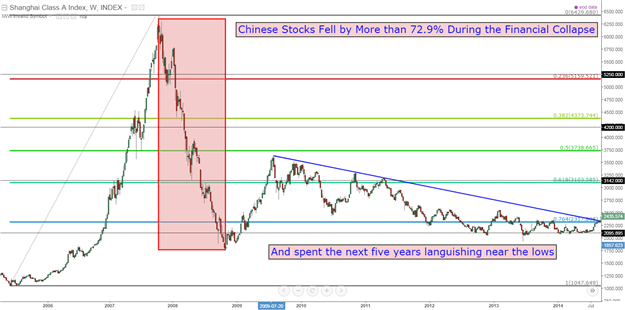China is slowing down. This should not be news, nor is this really up for debate. It’s pretty much an accepted fact at this point. But what isn’t known is how aggressively the economy in China is slowing down. Some analysts are anticipating a ‘hard landing,’ as years of credit excess may wreak havoc as the constant growth engine in China, industry, suffers massive declines. And then there are analysts that are expecting a ‘soft’ landing, with a much more manageable set of conditions that will allow China to continue its conversion to a more market-based, consumer-driven economy while offsetting the downward pressures that are to be expected with a contracting economy.
This all came to roost earlier this summer, as Chinese stocks began to take an absolute beating that eventually grabbed the attention of hedge funds around the world. But looking at the decline without the proper scope misses out on some much needed context, for these were all gains that were accumulated in the very recent past. The Chinese equity story really re-started last September, as Chinese stocks were trading perilously close to their Financial Collapse lows. The Financial Collapse was especially severe in China as stocks dropped by well over 70%. This dented investor confidence in the country, and from that point on there was a significant reticence of investors to jump into the stock market: Many Chinese investors just didn’t trust it. Instead, property was the investment vehicle of choice, and real estate prices continued their ascension until most Tier 1 cities were far beyond the point of affordability for the average Chinese resident.

Created with Tradingview; prepared by James Stanley
But around September of last year as Chinese economic data was beginning to look grim, there were few places left to invest. So, with some encouragement from the government, Chinese investors began jumping into stocks again, and as is to be expected by anyone with a basic understanding of supply and demand, prices went up. And as prices went up, more investors were incentivized to jump in the market. And before you knew it, The Shanghai Composite (shcomp) was up by 50% in 5 months. Five months after that, we had another outsized move to bring the running tally to 100%: So Chinese stock prices doubled in 10 months.











Leave A Comment